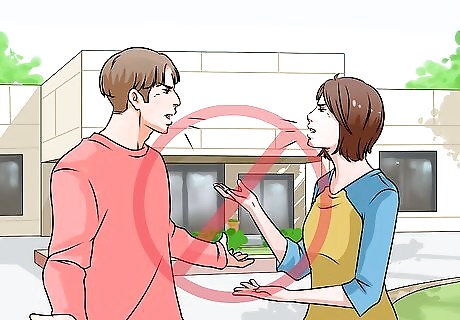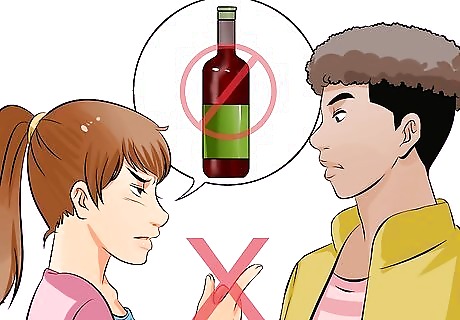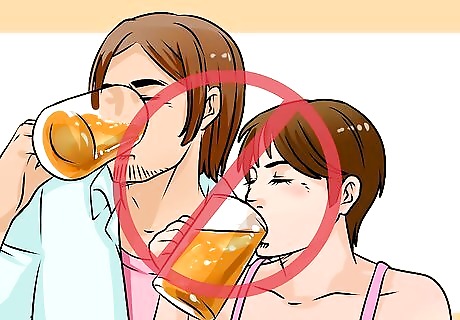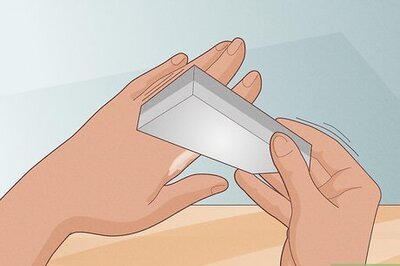
views
Asking the Person to Stop Drinking

Look for signs of alcoholism. Someone who has an "alcohol problem" may not have crossed the threshold into full alcoholism. An alcohol problem can be addressed and overcome by someone on his own, but alcoholism is a disease that cannot be cured. This requires outside intervention to control. Alcoholics usually show these signs: Problems at work and school, such as showing up late or not showing up at all due to hangovers. Frequent blackouts after heavy drinking. Legal problems due to drinking, such as arrests for being drunk in public or drunk driving. Inability to leave a glass of alcohol half full or to be around alcohol without drinking it. Planning schedules around drinking and hangovers that follow. Relationships that have been harmed due to the person's alcohol use. Craving alcohol first thing in the morning and experiencing withdrawal symptoms when not drinking.

Practice what you'll say. Once you've decided to talk to the person about their drinking habits, practice exactly what you'll say. Keep it brief, non-judgmental, and detailed. This will keep the other person from zoning off if you talk too long and keep him from feeling as though you're emotionally ganging up on them. Try to remember a few key sentences that are important to you. For example, you could say, "I love you and I'm worried that you're hurting your health by binging on the weekends. I'll support you in getting the help you need." It may also help to have a group of trusted friends to help you talk to your loved one. Be careful that they do not feel ganged up on, however.

Talk to the person. If you've noticed some signs of alcoholism, have a talk with the person and tell them that you're worried. Explain that his behavior is affecting other people and that it's time to stop drinking for their own good and the good of the family. Tell them about the problems that their drinking is causing. Pick a time to talk when the person hasn't been drinking. Speaking in the morning is usually best. It's alright to talk if the person is feeling hungover. Bring up the fact that the person is harming their body by making it sick day in and day out. Be prepared for denial. Alcoholics typically deny there is much if any problem with their alcohol intake. They are unlikely to acknowledge the issue, or take it seriously until they are ready. While you should keep attempting to bring truth and reality to the person, be prepared for the fact this is unlikely to be the day.

Avoid argument, judgement, or nagging. When you're talking to the person about his drinking habits, don't start by accusing or judging the person. Avoid constantly nagging about the drinking problem, since this could just make it worse. Arguing will make it harder for the person to open up to you about the reasons for drinking. Be warned this will likely trigger a personal attack or personal criticism. Part of an alcoholic's defense against fully recognizing what negative effects their behaviors are having is often by making other people the reason they drink. As a result, commonly any comment that there is a problem will be countered that the "problem" is the issue (such as work or spouse), not the person. Try listening honestly and be reasonable. This, of course, is much easier said than done. But it is hard to get angry at someone who is being pleasant, accepting, and honest. You do not have to accept blame or abuse. Healthy boundaries are important in dealing with an alcoholic, as often this is lacking with a person dealing with alcohol issues. Even if there are problems that have contributed to alcohol issues (relationship issues, for instance), 'you did not cause the alcoholism'. Nor is it acceptable to act in an cruel, manipulative, irresponsible, or otherwise abusive way. You have every right to walk away or otherwise disengage from an alcoholic acting in such a manner. This is not "being mean" or "abandoning" the person. If the alcoholic does not have to face that such behavior has a negative effect on their life, they are likely to keep drinking.

Try to understand the person. When you're talking about their drinking, be sure to ask if there are problems or things that stress them, leading them to drink. You should also find out if the person has a good support system. If not, you may want to suggest getting group help. The person may not want to discuss the issue that leads to the drinking or might deny there's even a problem. Understand, however, that alcohol use fundamentally changes a person, often to the point it is hard to know what is due to drinking, and what is the real person inside. Alcohol can cause irrational behavior, poor decision-making, and muddy thinking. This can still continue even when an alcoholic is not currently swigging a drink. Asking an alcoholic "why did you do that?" may not yield useful answers. The "answer" may simply be "because of the alcoholism." It is OK if you still do not understand. You may not be able to, and you may not be in the best position to do so. Just loving a person a lot does not mean you can fix them. For example: A 14 year old may not be able to understand the world the way a 41 year old can. A person who has not been in combat cannot fully comprehend what it is like to see a comrade die in battle. EXPERT TIP Julie Krizner Julie Krizner Licensed Professional Counselor Julie Krizner is a Licensed Professional Counselor and is the Executive Director at Axiom Family Counseling Services. With over 10 years of professional experience in the mental health field, Julie is trained in trauma, marriage, and family therapy. Her clinics have programs that specialize in addiction and she has extensive knowledge about addiction and medications to assist with overcoming it. Julie is a Certified Advanced Alcohol and Drug Counselor in the state of Pennsylvania. She received her Bachelor's degree in Psychology from Saint Vincent College and a Master's in Mental Health Counseling from Capella University. Julie Krizner Julie Krizner Licensed Professional Counselor Seek the why behind heavy drinking. If you're trying to address heavy drinking, don't just treat the drinking itself — understand what emotional or social needs alcohol is fulfilling, and why the habit has become excessive. Pinpointing these root causes provides critical insight into the core issues fueling the unhealthy dependence.

Do not try to force the person to stop drinking. Alcoholism is a complex disease, and one of the difficulties is the paradoxical nature of the condition. If you push a person to quit drinking, it may actually lead the person to drink more. You need to understand that you cannot stop the person from drinking. But you can suggest and assist the person in finding help. This does not, however, mean you help the person get alcohol, or condone them using it.
Being Supportive

Do not drink around the person. Drinking around an alcoholic, like it or not, puts up a "you drink, why can't I?" argument for the alcoholic--it does not matter if you can handle drinking because they cannot. It may also lead to unhealthy drinking habits within your own life. You can help the other person by meeting and spending time in places that do not serve alcohol. This will make it easier for the person to stop drinking.

Talk to others. Ask people closest to the person if they've noticed any concerning behaviors or if they think the person has a problem. Avoid telling them the person is an alcoholic and be careful not to tell anyone who doesn't need to know. Don't risk destroying the person's privacy. If you think the person is an alcoholic, the time has come to get others involved. The problem is too big for you to tackle by yourself, and you must get outside help for the alcoholic as soon as possible.

Talk to the person. Remind them that you're worried, that you care about them, and want them to get help. Share your thoughts on what you've noticed and ask what you can do to help. Be prepared if the person doesn't want your help or avoids you for a while. If the person is open to getting help, offer to put them in touch with a professional. Have a list of resources ready to hand to the alcoholic. It should include contact information for local Alcoholics Anonymous groups, the names of therapists and psychologists who specialize in helping alcoholics, and a list of rehabilitation centers.

Try to involve a professional. If the alcoholic refuses to go into treatment or even consider it, try to involve a therapist. A therapist will have experience dealing with different types of alcoholics, and will work with you to create a plan for the alcoholic. A professional therapist will know how to handle defensiveness and other behaviors that may upset or confuse close family members.

Be encouraging throughout the treatment period. If the alcoholic does agree to go to treatment and take steps toward sobriety, make it clear that you're supportive and that this is the best thing the person could be doing. Curb the person's feelings of guilt or embarrassment by showing that you're proud of them for getting help.

Be prepared to support a relapse. If the person attended a rehab center and has completed a course of treatment, they may be vulnerable when they leave. For most people, treatment is never over and alcoholism is something the person must constantly deal with. The alcoholic's family and friends should continue to support the person, even if he relapses. Relapse happens with almost every alcoholic. Come up with non-alcoholic activities to do together. Very often, when an alcoholic has made drinking so much a part of their life, finding activities that are alcohol-free can feel unnatural. Being a good role model and friend can mean rediscovering that one can have fun, socialize, and relax without a drink. Encourage the person to attend AA meetings frequently and to get counseling when needed. Let them know that you're there to talk if they need you.

Take care of yourself. Being a close friend or family member of an alcoholic is exhausting and can lead to feelings of helplessness and despair. Alcoholism is often called a "family disease," since its effects go so far beyond the life of the person with the alcohol problem. Take time to do activities that make you feel good and bolster your confidence and self-esteem during this time. Consider getting therapy for yourself. It might be helpful to have someone to talk to about your feelings during this emotionally difficult time.

Spend time with other friends and family members. You need to take breaks from dealing with the person's drinking problems. While you're focused on the well-being of your alcoholic family member, spending time with other people in your life can help take your mind off of things and restore your energy. Make sure you're dealing with your own personal issues during this time. Avoid focusing so much on the person with the drinking problem, that you hurt other relationships in your life or develop dependency issues of your own.


















Comments
0 comment